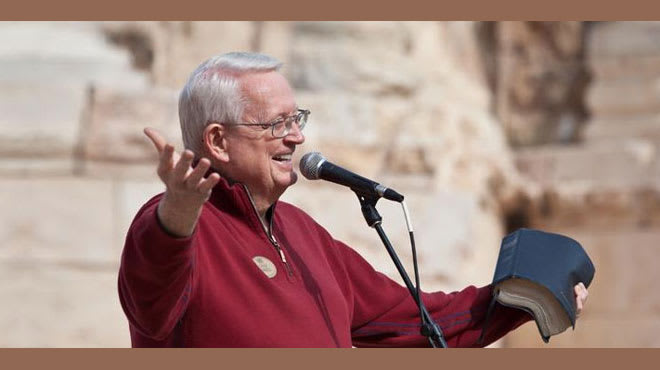God Works in Our Weakness

If you’ve seen the movie The King’s Speech, or if you’ve lived long enough to remember, you know that the man we now refer to as King George VI took the throne when his brother abdicated. But this father of Elizabeth, now Queen Elizabeth II, had a dreaded disability—a stammer that he felt made him unfit to reign. With the help of a speech therapist, however, the king found his voice and led his country through the dark hours of war.
I can identify with his struggle. Though I have spoken to millions in my adulthood, when I was growing up, I never imagined myself as a preacher. Not only was I uninterested, I lived with a major struggle: I stuttered. My disability grew steadily during my early teenage years, and by the time I entered high school, speaking in front of a large group was the last place I wanted to be.
All that changed the day I met Richard Nieme. Mr. Nieme (pronounced “Nee-mee”) was the drama and speech teacher at Milby High School in Houston, Texas. For some reason he determined to get me into one of his courses. Perhaps my sister, Luci, tipped him off, since she used to endure my q-q-q-q-quoting various p-p-p-poems I’d m-m-m-memorized. Learning the lines came easily, but delivering them was another story. I could see them in my head, but my tongue and lips failed to cooperate. Trying to impress my family as the poet laureate of the Swindoll clan while quoting Coleridge’s moving lines from “The Rime of the Ancient Mariner,” I sounded like Porky Pig on a bad day.
That explains why I backed away when Mr. Nieme approached me, convinced he was talking to the guy at the next locker. When this determined drama and speech teacher pressed for an answer, all I could do was squeeze out, “M-m-m-m-me?” I reluctantly gave in.
By the time I was a senior, I had landed the lead role in the play, “George Washington Slept Here.” I had signed on. Little did I know the difference that experience would make, not only for the rest of my high school years, but for the rest of my life. I, who once stuttered like Moses, have seen the Lord transform my stammering Coleridge into speech for the King.
But sometimes God chooses not to change our disabilities. Moses’s stuttering required Aaron’s help. And the apostle Paul prayed three times for the Lord to remove his own “thorn in the flesh.” Scholars are unsure about what exactly that “thorn” was, but whatever the disability, the Lord’s answer to the prayer for its removal was “no.” Why? So that God’s power would be seen in Paul’s weakness. And Paul’s response? “I will boast all the more gladly about my weaknesses, so that Christ’s power may rest on me” (2 Cor. 12:9).
My daughter Colleen Swindoll-Thompson understands well such an answer to prayer. She directs Insight for Living’s special-needs ministry, a work borne out of raising a child with autism and other disabilities. In Colleen’s words, “Perhaps you believe your life has little value, you’re an unnoticeable shadow, disabled and lonely, or are raising a child this world finds odd or weird. That is not the truth. God can use even the most challenging circumstances for good. God is cultivating in each person magnificent gifts we can share with one another in this world.”
What is your greatest weakness? He can make His strength shine through it, whether by healing or by granting daily grace. Do you want Christ’s power to rest on you? Let your greatest weakness demonstrate His greatest strength.
About the Contributors

Charles R. Swindoll
Charles R. Swindoll has devoted his life to the accurate, practical teaching and application of God’s Word and His grace. A pastor at heart, Chuck has served as the founder and senior pastor-teacher of Stonebriar Community Church in Frisco, Texas. His leadership as president and now Chancellor Emeritus of Dallas Theological Seminary has helped prepare and equip a new generation for ministry. Chuck and his wife Cynthia, have four grown children, ten grandchildren, and two great-grandchildren.

